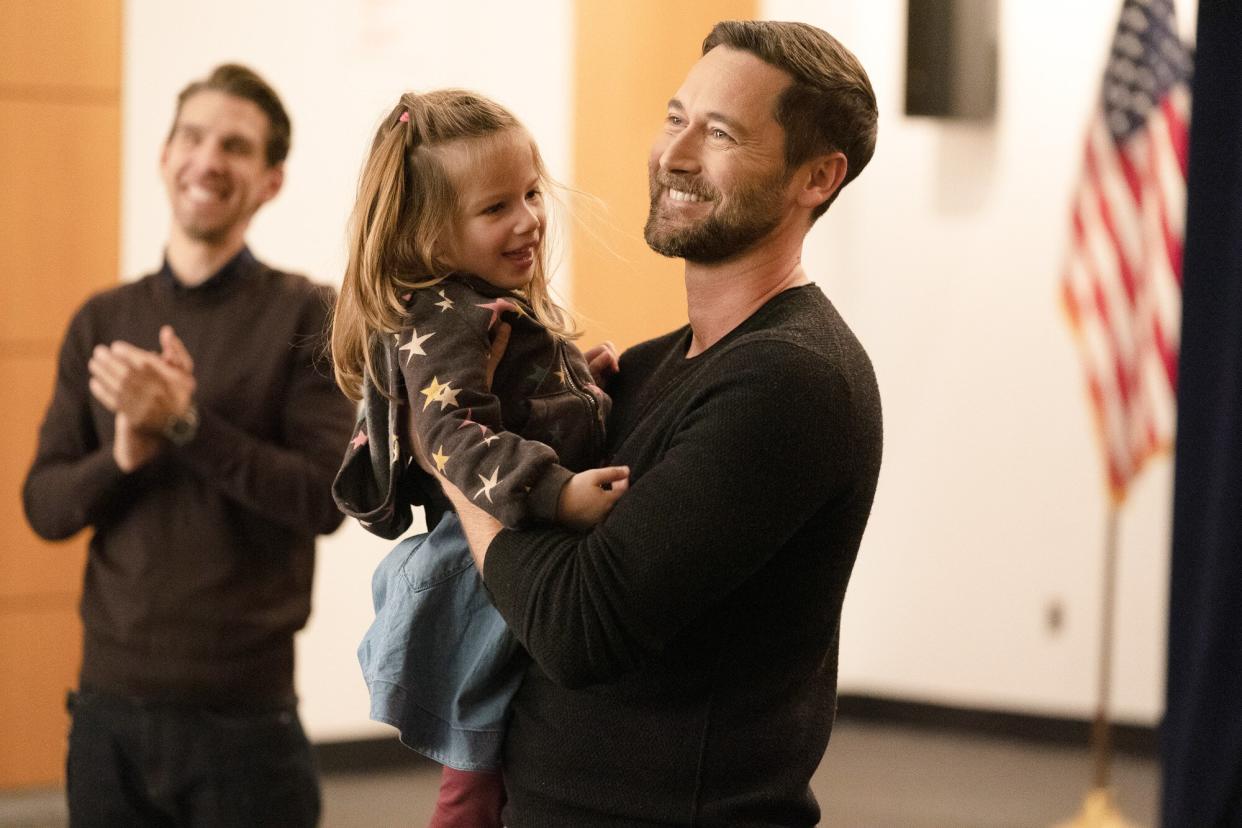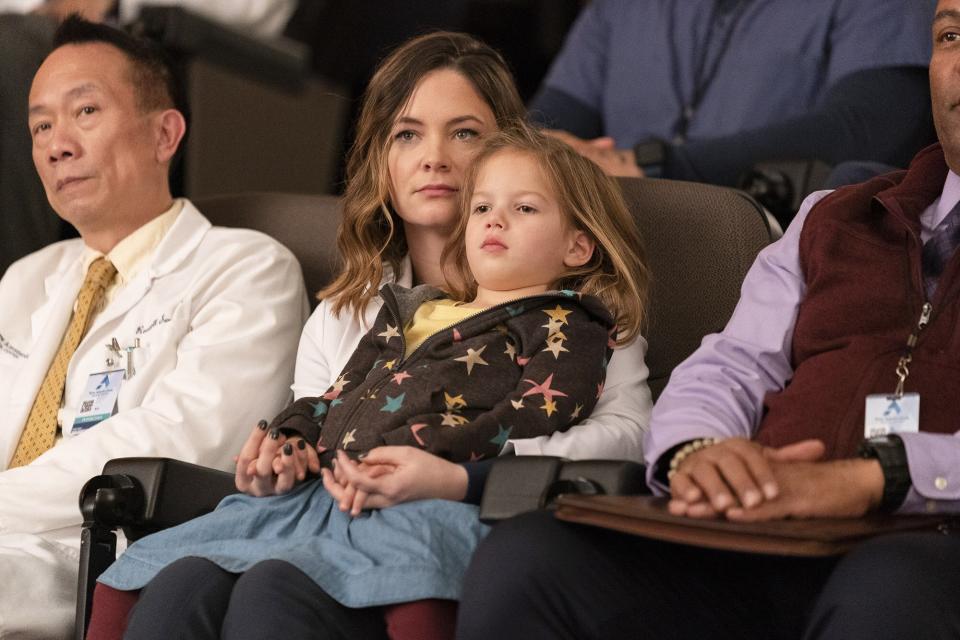New Amsterdam bosses break down that emotional series finale surprise

- Oops!Something went wrong.Please try again later.
- Oops!Something went wrong.Please try again later.
WARNING: This post contains spoilers for the series finale of New Amsterdam.
New Amsterdam ended by beginning a whole new chapter.
The series finale centers on Max Goodwin's (Ryan Eggold) last day at New Amsterdam before leaving for a job at the World Health Organization. After giving his last speech in the auditorium, a case comes in that requires most of the staff (53 surgeons to be exact) to save a mother who fled Ukraine. Throughout the final hour, we also follow a woman who is trying to find her way around the hospital to start her first day as the new medical director. In the episode's final moments, we discover the new director isn't having trouble because everyone's busy saving a life, but rather, she's having trouble because she's Max's daughter all grown-up in the future, beginning her first day following in her father's footsteps at New Amsterdam.
Throughout the series finale we get glimpses of when all the characters decided to become doctors, but a lot of what happens between Max's last day and Luna's first is left untold. We do know that Max left Dr. Elizabeth Wilder (Sandra Mae Frank) his successor instead of continuing their romance and not much else. Dr. Goodwin leaves the hospital in the hands of his talented friends as he heads overseas for his next adventure.
EW spoke to show showrunner David Schulner and executive producer Peter Horton about the emotional ending of New Amsterdam, choosing to be ambiguous, and more.

Ralph Bavaro/NBC Nora and Opal Clow as Luna, Ryan Eggold as Dr. Max Goodwin on 'New Amsterdam'
ENTERTAINMENT WEEKLY: How did you decide on Luna being the new medical director in the future to end the series?
DAVID SCHULNER: Funny story. It was something floating around in the ether that month because my 11-year-old daughter pitched me that ending and I was like, "You do your school work and I'll focus on writing." A week later, Laura Valdivia, one of our writers, pitched me the same ending and then a week after that Erika Green Swafford, another one of our writers, was on set with me and was like, "I know might sound crazy, but what if Luna came back as the medical director?" Within three weeks, they all pitched me this ending and I was like, "This is our ending."
Can you talk about the emotional impact of that choice and seeing Luna follow in her father's footsteps?
SCHULNER: We opened the pilot essentially with Max in the auditorium and the first thing he says is, "My sister died here, I grew up here and this is why I wanted to work here." It felt fitting for Luna to be in that same auditorium and she got to say, "My mother died here. I grew up here and that's why I wanted to be a doctor here."
Once we knew that, the foundation was there. Then we realized why not see the moment Luna was inspired to be a doctor like her father was and the moment when everyone was inspired to be the doctor they were? The story kept building upon itself until it became an origin story, not just for Luna, but for all of our characters.
The series finale was about Max's last day. Do you think he was successful in his mission when he took over at New Amsterdam?
PETER HORTON: Max felt like he had done what he came to do and it was time to move ahead. That's the theme we've been talking about with a number of characters. From that standpoint, he felt very successful and satisfied at the end. Same with the hospital. The hospital [is] a better place than when he came, so the answer is yes and life is complicated. There will be troubles, there will be obstacles, but he's moving on to bigger venues to try and solve bigger problems.

Ralph Bavaro/NBC Sandra Mae Frank as Dr. Elizabeth Wilder, Nora and Opal Clow as Luna on 'New Amsterdam'
Was this always the ending you intended?
SCHULNER: The World Health Organization gave us a rare commendation a couple years ago for our season 3 body of work. They have been asking us, "How can we help?" They've been trying to find a way for us to collaborate together and we couldn't figure out a way to make it believable or make it interesting because stories have to have conflict and what conflict do we want to start with the World Health Organization? Their work is incredible and inspiring for us, so we thought having Max join [WHO] was the perfect thing for us over the last couple of years.
HORTON: That was so head-trippy. They were reaching out to us saying, "Good job," so we had to do something back. They kept saying, "Let's collaborate on a story," so this was our way of saying thank you.
SCHULNER: They don't know! They don't know Max is joining the World Health Organization. It'll be a total surprise for them.
Why did you choose to have Max not end up with Elizabeth and instead leave her the hospital?
SCHULNER: Criminal Minds was canceled and then rebooted two years later. In our reboot, we will give you that answer.
HORTON: We also love ambiguity. I had a writer explain to me one time that there's a difference between confusion and ambiguity. In storytelling you don't want confusion, but you want ambiguity. We wanted to leave it hanging there for the audience to participate in it. If we tell them what happens they don't get to imagine it and take whatever direction they want to take it in. We wanted to give them that freedom.
We talked about Max and Luna, but what about how the other characters' stories were wrapped up?
HORTON: We felt really satisfied with the endings we came up for everybody who was still with us. Obviously we wish we could have had a great ending for Helen Sharpe and Freema, same thing with Anupam. They were such great characters in our show and such good actors. It would have been great to have been able to resolve their stories with as much freedom, so that's a little frustrating. Otherwise, I feel good about where everyone ended up. I love that Iggy asked his divorced husband out on a date. There's just something so wonderfully positive about that. Again, [viewers] can imagine if it will work. Will they make it through this? That's a satisfying place to leave that story.
As storytellers, what's your takeaway from this show?
HORTON: I have a father-in-law who's a doctor and years ago I directed the pilot to Grey's Anatomy and he said, "This is nothing like what we go through." When this came along, I played it for him and he loved it. This hospital show really captured what doctors got into it for, the idealism and the hope that this is what their lives and careers could be. That's really unique to the show and I'm really proud of that.
This interview has been edited and condensed.
Related content:

